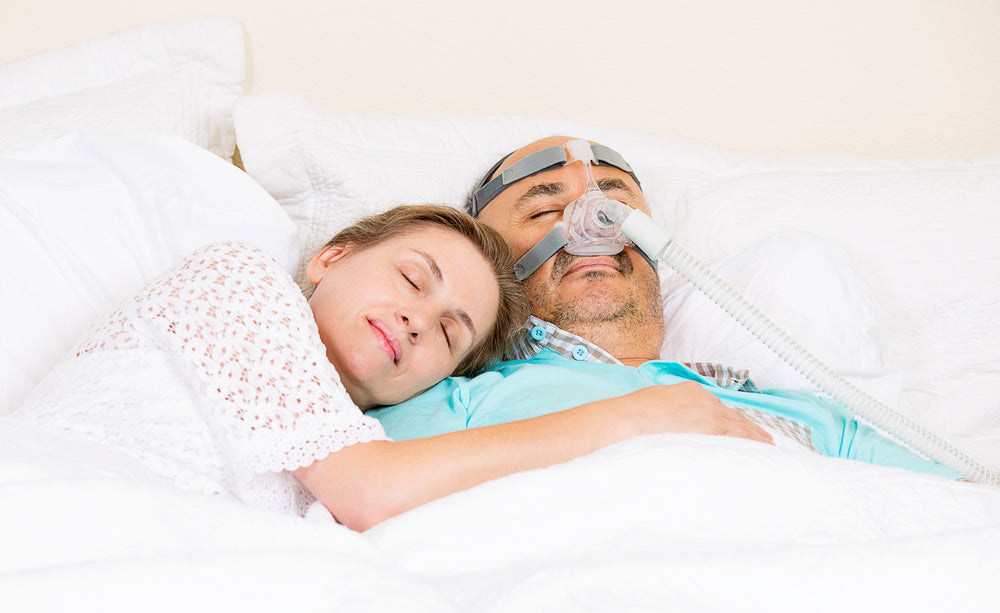Because it directly solves the problem of airway blockages during sleep, CPAP or AutoPAP therapy can immediately cure snoring and get you sleeping better. Once you fully acclimate to sleeping with your new CPAP mask, you might start noticing that you feel more alert and energized as soon as the next morning.
While starting CPAP therapy can be a challenging process that takes some time, you’ll find you suffer from fewer sore throats, headaches, and low energy that come from untreated sleep apnea.
However, as with all treatments, if it is not working or being used correctly, there is a chance of relapsing or sliding back into old symptoms—especially because sleep apnea treatments require external machinery. If you start waking up tired, waking up with headaches or a sore throat, or even if your partner or spouse tells you that you’ve started snoring again, then you need to figure out what is causing this backslide.
And, more often than not, a leaky mask could be the culprit.
Why Does a Leaky CPAP Mask Matter?
Because the nature of CPAP or similar therapies involves specific levels of air pressure for effective treatment, a leak can throw a wrench into the whole operation. Your specific air pressure settings have been determined and prescribed by a board-certified sleep physician for your individual apnea severity, so it’s calibrated perfectly to relieve your apnea at a certain level.
It is true that all CPAP machines do account for some leakage so you can exhale CO2 safely during sleep, but an unintentional leak from a hole or a weak seal on your mask can cause the air pressure to dip below the necessary range to keep your airways unobstructed.
Please note that a small amount of mask leak is completely acceptable and factored into your treatment. Your CPAP machine will compensate for this small amount, so be sure not to wear your mask too tight. Wearing your mask appropriate will prevent tissue damage to your face and skin.
If you discover or even suspect that you have a CPAP mask leak, you need to make sure to address it promptly so you can resume regular sleep apnea treatment.
What Causes Mask Leaks?
There are several reasons why your mask could be leaking.
Poor Fit
Ensure your mask is appropriately fitted to your face. Gapping around your cheeks or mouth indicate that it is not fitted properly. Also ensure your elastic straps aren’t too loose or tight for an appropriate fit. Visit our resource to help you fit your mask.
An Old Mask
CPAP masks break down and wear out with regular use. Over time, the silicone can soften and grow thin, leading to cracks, holes, and tears. Or the mask cushioning can degrade and affect the quality of the seal. You should chance your mask cushions every 1 to 3 months and your entire mask 2 to 3 times a year.
Dirt & Oils
You need to keep your sleep apnea mask clean. We have some suggestions for cleaning your CPAP hose, but be sure to wipe down and disinfect your CPAP mask weekly so the natural oils and dirt on your face don't break it down too soon.
Sleep Position
If you know you tend to flop around a lot in your sleep, or if you catch yourself waking up in a different position than you fell asleep, it’s possible you’re knocking your own CPAP mask off. Consider getting a special pillow or sleeping apparatus to keep yourself in one position all night to see if that helps.
High Air Pressure
Your pressure settings may need to be lowered if that’s the cause of your leakage. If you have a rather high pressure setting, it can push the air out the sides of your mask. Be sure to talk with your sleep physician about how to compensate for pressure loss.
What To Do When You Find A Leak
When you do pinpoint the cause of your snoring, be sure to take the necessary steps to restart an effective treatment cycle. You have a few options if you believe a leaky CPAP mask is to blame.
Test a New Type of Mask
If you have a nasal pillow CPAP, you may want to test out a full face mask that covered both the nose and mouth. If you find that you are breathing and snoring through your mouth during sleep, then a full face mask is the easiest way to resume appropriate treatments.
Replace Your Old Mask
If you believe the age of your CPAP mask is contributing the leakage, then be sure to order a replacement part as soon as possible. A CPAP mask will need replacing after 6 months to a year of use.
Increase Pressure Settings
If you and your doctor determine that you need to increase your pressure settings to compensate for mask leakage, then do so. However, never change the pressure settings on your CPAP without consulting your sleep physician to avoid other serious complications.
Mask Accessories
There are many others out there who experience the same struggles with CPAP leaks as you do. There are accessories available like mask sealer, full face liners, nasal masks and pillow liners, nasal gel pads, CPAP cushions, and eye shields that can solve your mask leakage and help you sleep better.
Having a leaky CPAP mask is absolutely not the end of the world. In fact, it can usually be solved fairly quickly if you can diagnose the problem and get replacement parts and accessories. If snoring persists after you feel you’ve address the leak, be sure to talk with your sleep physician about next steps. If you have a CPAP supplier, you may also be able to contact them with questions about your equipment and replacement machinery.

